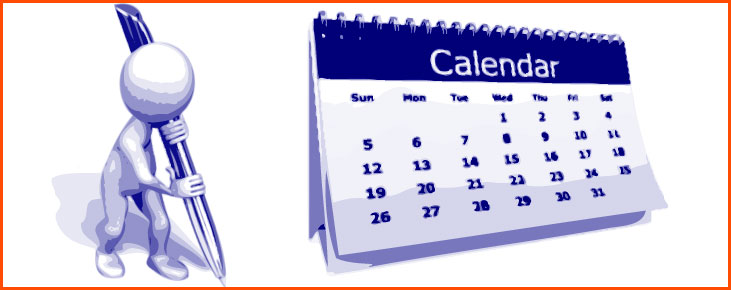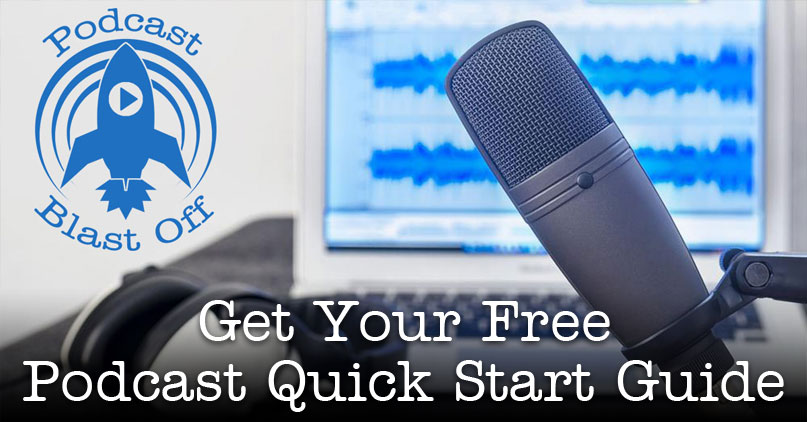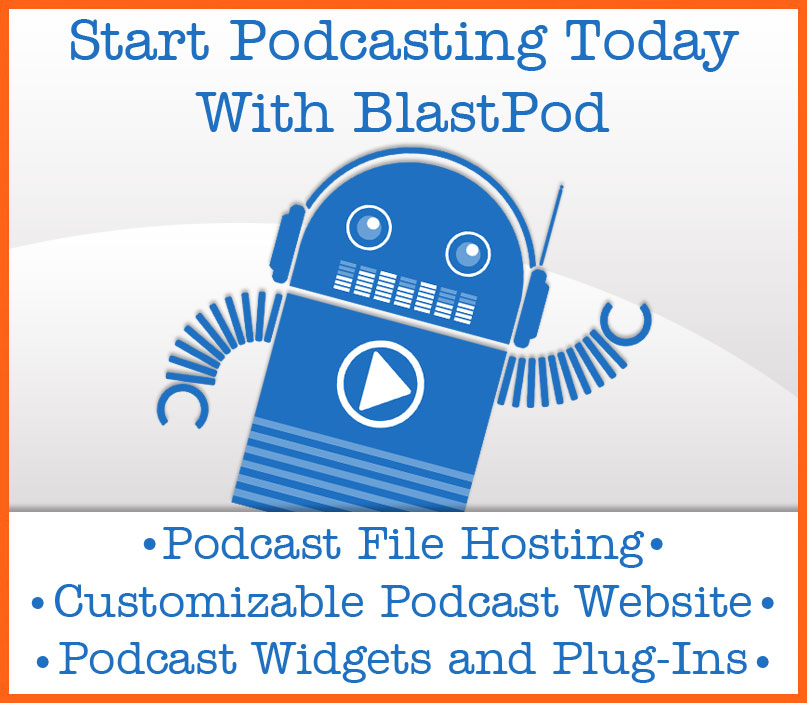Most podcasts fail before they even start.
Uncertainty, procrastination, and self-doubt can kill a podcast before you ever hit record on the first episode.
Starting any new project can feel a bit like walking into a dark room without a flashlight. This applies to a podcast as much as anything else. And for this reason, most hopeful podcasters never transition into actual podcasters.
I don't want that to stop you. So, I'm giving you a flashlight. I've launched - and helped launch - over a dozen podcasts now, so I've got it down. And in this post, I'm gonna lay out the top 5 things to get done so you can launch your podcast, ASAP.
If you want a more in-depth explanation, make sure to sign up for our full Podcast Launch Course. But, if you want a quick start guide, you've come to the right place.
1. Figure out Your Big Idea

The first thing you'll want to nail down is the overall theme of your podcast. We'll call this the Big Idea of your podcast. You'll want your Big Idea to be something you can create lots of episodes about, as well as get excited to talk about.
When coming up with the Big Idea of your podcast, it's best to find something you have a lot of knowledge or a lot of passion about. If you have to go with one, over the other, having passion is the more important of the two. You can gain the knowledge as you go, but you can't fake the passion.
You'll also want to come up with your own unique spin on the Big Idea of your podcast. That unique spin should be something that pertains to you, as a person. It can be a unique part of your personality that shines through. It can be your unique take on things. It can be something from your background that gives you a unique perspective.
Chances are, there's already someone out there with a similar idea for a podcast like yours. You need to know what makes your podcast different in a way that your listener values. You need to know what's special about your podcast that makes your listeners choose you, over the other guy.
Once you know your Big Idea, and your unique twist, you'll need to come up with a name for your podcast. This should be something that shouts out "Listen To Me" while someone is scrolling through iTunes.
As such, you'll want to keep a couple things in mind while brainstorming on your podcast's name. 1) The listener should be able to tell, at a glance, what your podcast is about, and 2) it should convey what's special about your podcast.
The most important thing to remember is this: don't be too clever or creative when naming your podcast. If your humor goes over the head of your listener, or if they don't make the connection between your name and your content, they'll never listen.
After you've come up with a few ideas for names, bounce them off a friend or two. Ask them to guess what your podcast is about, based solely off of hearing the name. If there is one that people like the best, that also tells them what your podcast is about, it's a winner. Go with that one.

Having a successful podcast is about serving your audience.
It's not about having the best guests. It's not about having the prettiest iTunes art. It's only partially about having great audio.
By far, the most important aspect of having a successful podcast is know your audience, and knowing how best to serve them. To do this, you'll need to nail down your audience of one; your ideal listener. This is the one person that you make your podcast for.
Of course, you'll want more than just one listener. But to get them, you'll need to nail down that one target listener your podcast is for. In marketing, we call this your avatar. In speaking, we call it your audience of one.
If you can understand who your podcast is for - what drives them, what scares them, what keeps them tuning in - you'll have a much better idea of how to serve them.
But, if you have no idea why people are listening, you'll have no idea on how to keep them listening. If you serve the needs of your ideal listener one week, and completely ignore their needs the next, good luck getting them back for a third.
Fight the urge to serve a broad audience, and really nail down the one listener that you want to serve. You'll thank me for it later.
Speaking of having only one listener; that might actually be the case. At least, it might when you first start out. It's not uncommon for a new podcast to only have a few downloads for the first couple of episodes. Especially if you don't follow a good podcast launch strategy. Don't let this get you down.
Imagine looking at your download statistics, and seeing only 24 downloads. That might not seem like a lot.
Now, imagine standing at the front of a small room, with 24 people focusing all their attention on you. You speak, they listen. They hang on your every word. And they come back, every week, for more.
That's what those 24 downloads mean. Don't write them off. Embrace them. Appreciate them. Love them. And they will love you back.
Now that you have your audience, and as it continues to grow, you'll start to understand your true role. You are not merely a man or woman with a microphone. You're not just a loudmouth with an audience. You're much more than that. You're a leader. Embrace that.
You are a servant / leader, and that's the best kind of leader to be. It may be an intimidating role to fill, but you can do it. Even if you're only a few steps ahead, you're leading.
Don't let self-limiting beliefs hold you back from your destiny. Step up and be the leader they need.

Everybody has their own personal style. That should also be true of your podcast. What's more, your podcast style should flow from your personal style. So, let's start from there.
Are you more of a serious person or more of a silly person? Do you like strict planning, or do you prefer spontaneity? These parts of your personality can influence the feel of your podcast. Let them.
Next, you're gonna need to figure out your role as host.
Will you be a one man show, rocking the mic solo? Will you have a co-host ride shotgun, making your podcast more of a conversation? Or, will you bring on guests, and play the role of interviewer or reporter?
Each of these has their own pros and cons. You'll need to pick the one that best suits you and your comfort zone. But keep in mind; you don't have to be held down to just one way of doing things. You can always switch it up from time to time.
Whichever role you choose, one thing will always be true: you have to give people a reason to listen. And when it comes to podcasts, there are four main reasons people listen. So make sure you provide at least one of these, if not all of them, every time you hit record.
Your podcast should educate, inspire, entertain, or inform the listener. They tune in for what they can get out of listening. No matter what your hosting style, or your personality, you need to fulfill at least one of these criteria.
Educate. Inspire. Entertain. Inform.

Gone are the days of broadcasting bottlenecks. Thanks to modern technology, anyone can get their message out there. We've got a more in-depth guide to building a podcast studio, but let's just cover the basics, here.
The first thing you're gonna need is a microphone.
I recommend getting a cardiod mic. Cardiod mics pick up sounds right next to the mic head, but cut out anything outside that range. This means squeaky chairs, mouse clicks, and passing cars will not make it into your podcast.
The mic I like best for beginners is the AT2005USB. This mic is great for a number of reasons. Great sound: it's a cardiod. Multiple inputs and outputs: USB, XLR, headphones jack. And it's affordable: less than $100 dollars, most of the time.
I can't impress upon you enough; if you're serious about starting a podcast, this is the mic to get.
Next, you'll need some sort of way to record your podcast. This can be done directly into your computer, or into a portable recording unit. For field interviews, and recording skype calls, Zoom puts out some great units. I just got the Zoom H6, and I'm loving it.
When it comes time to mix down your podcast, you're gonna need some sort of audio mixing software. These are called DAW's, which stands for Digital Audio Workshop. They allow you to record, edit, control volume and EQ, fade in and out, and much more. And the best part is, you can get pretty high quality software for free these days.
If you're rocking the Mac, Garage Band should come pre-loaded. It's easy to use, has multiple tracks to work with, and mixes down straight to iTunes compatible files.
If you're a PC user, Audacity is a great option. It's open source, does almost everything Garage Band can do, and it's free. For non-Mac podcasters, this is the most popular option.
That's all you need to get started. If you want to take your podcast studio to the next level, make sure to check out our epic post on How to Build a Podcast Studio on Any Budget.
5. Just Get Started Already

This last part is both the easiest, and most difficult.
The first step of any journey is always the scariest. The first episode of your podcast can be the same way. So here are a few quick tips to get you started.
First, come up with a topic for your first show. Sit down with a piece of paper and list out a few things that you'd like to talk about, and pick one. Then on another piece of paper, list that topic at the top of the page.
Then come up with 3 or 4 talking points you'd like to cover about that topic. This is just the skeleton of your show, but it gives you a good idea of how you'll want to flesh out it.
Next, jot down the final thoughts or closing point you'd like to make. If you're doing an interview, you can do the same with questions to ask your guest, and where to send your listeners for more information. The point is to have at least a bit of a road map, before you set out on your journey. This way, you don't just end up wasting your time, or the time of your listeners.
Next, pick a time and date to record. This can be right now. It can be a week from now. It can be a time that you and your guest or co-host agree upon. But it needs to be scheduled. What doesn't get scheduled doesn't get accomplished.
So pick a date, and commit.
Lastly, hit record and start talking.
Remember, perfection is the enemy of production. So don't wait until every light is green before you start up the engine. Don't wait until you have the perfect episode in mind before you start recording.
Start now, and improve as you go.
Your first couple of episodes will be learning experiences. You'll make some mistakes. And that's ok. That's how you get better.
But if you never take those first steps for fear of stumbling, you'll never get anywhere with your dreams of becoming a podcaster.
Get over your desire for perfection. Get over your fear of embarrassment. And get started now.
This, of course is just an abbreviated road map.
If you want a deep dive into launching your new podcast - including how to define your ideal listener, create your podcast's Big Idea, and launch your podcast like the pros do it - you'll need to sign up for our exclusive course. You can get more info on that, by clicking the link below.


















